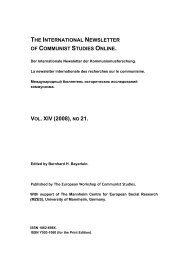11RXNdQ
11RXNdQ
11RXNdQ
Create successful ePaper yourself
Turn your PDF publications into a flip-book with our unique Google optimized e-Paper software.
The Political Thought of Patrice Lumumba* 107<br />
praxis of unification; as Merleau-Ponty said, opposition can easily become betrayal when<br />
it increases discord and disintegration: central government should reduce it, by force if<br />
necessary. From this point of view, strikes or urban riots, however justifiable their<br />
demands might be, are just as dangerous as ethnic conflicts. The latter delay the harvests<br />
and fragment the Congolese land; the former reduce production. For every conceivable<br />
reason, it was indispensable that, in the first years of its childhood, the free Congo should<br />
not fall too far below the Belgian Congo from which it was born: therefore, centralism<br />
carries within itself a policy of social austerity. However, the Incorruptible – whether his<br />
name is Robespierre or Lumumba – must at the same time attack the governing class –<br />
his own class – to maintain its position as the universal class, in other words to prevent it<br />
entering into conflict with the rest of the country by virtue of its demands, lifestyle or too<br />
rapid an accumulation of wealth. That means that every social group is required to<br />
sacrifice its interests to the common interest. Nothing better provided that the common<br />
interest exists. After the tumultuous few months which followed his taking of power,<br />
Castro forced the workers’ unions to end their strikes and take their industrial grievances<br />
to arbitration. But he had just defeated the army of feudal landowners, driven them off<br />
and redistributed their properties to the underprivileged classes through agrarian reform:<br />
by demanding sacrifices from everyone, he invited the rural and urban workers to<br />
recognize their real unity and their common interest, which was the free exploitation of<br />
the island by all for the benefit of all. Put in another way, centralism can only equate<br />
national unity with the common interest if the revolution from which it has emerged is a<br />
socialist one. There was as yet no class struggle proper between the évolués who were<br />
taking power in the Congo and the unskilled workers or the agricultural labourers, but<br />
already the Congolese pseudo-unity was concealing the divergence of interests. Without<br />
knowing it, centralism demands national unity, that abstract minimum which is necessary<br />
for a new society to find time to develop its structures and its strata. But neither the<br />
exploited nor the future exploiters had any intention of sacrificing their concrete demands<br />
to this still uncertain future: the mere existence of the one class prevented the others from<br />
giving way. The proletarians knew how much the ministers earned. For their part, the<br />
ministers and all the évolués would make no concessions to anyone: they had a moral<br />
code based on merit; not to serve themselves first would basically be to sacrifice<br />
themselves to the illiterate masses, that is, to non-militants.<br />
Thus, owing to the absence of a mass movement, an armed struggle and a socialist<br />
programme, centralism, as a unifying praxis, seemed arbitrary to everyone. Everyone<br />
regarded the unity it aimed to establish as a concept without content; each group<br />
preferred its own concrete idea of unity to it, which, in that situation, was a cause of<br />
division. Everyone was against Lumumba: the provincial, federalist parties, the capital,<br />
the proletariat, the petty bourgeoisie which he represented and which should have<br />
supported him. What is worse is that the rural population put up with independence on<br />
the condition that they kept their ‘traditional structures’. Very few understood that the<br />
coutumier chiefs were the ‘native’ representatives of the Belgian administration. Now the<br />
kinglets lost everything when the colonists left. The Belgians had bought them and<br />
maintained them in place: this was centralization by division. The Congolese<br />
government’s policy would be to eradicate divisions: it had to create a black<br />
administration, teach the civil servants in Léopoldville and send them everywhere as the




